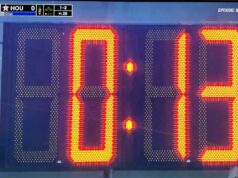Plant Engineering magazine has started a blog and they might have suckered me into mentioning their blog by praising this one:
The other one that is best kept best up to date is Mark Graban's LeanBlog.org, which leans on Mark's 12 years of Lean manufacturing experience at Northwestern University, MIT, General Motors, and through Lean consulting work. Mark claims to be a Northwestern fan, which is something we share. Like finding the right system to run on your plant floor, that can often be a painful experience.
I appreciate that. But, the Lean Blog has really developed into a team effort, with great contributions from the whole Lean Blog team — including a new blogger who will be announced on here soon. Stay tuned.
And yes, as mentioned above, I'm a long-suffering Northwestern fan (mostly suffering… the Rose Bowl was an exception as a good year). When former Head CoachGary Barnett told the Northwestern community in 1992 that he was “taking the Purple to Pasadena”, that promise seemed about as far fetched as a new CEO coming into GM and promising to overtake Toyota. But, they did it. You have to realize that Northwestern had, at one point, lost a record-setting 34 straight games (that's more than three full seasons of losing… and losing badly).
Maybe I'm rambling now… but there were some great leadership lessons from that era. Gary Barnett was somewhat disgraced as a coach at Colorado, but he did great things at Northwestern. I was a marching band geek, so had some access to Coach Barnett (he would come talk to us at practice sometimes, as we were in the stadium).
Through sheer willpower (and a lot of charisma), he got people to believe in the impossible. He told the group they would be successful — no excuse making, just hard work and a focus on attitude and team work… good lessons for any lean initiative. GM and Ford and Chrysler could whine and blame the unions, Japanese currency, healthcare costs, etc. Barnett could have blamed Northwestern's high academic standards or lack of facilities (compared to Iowa or Ohio State). But, Barnett focused on winning and winning the right away, such as not totally throwing out academic standards. Supposedly the 1995 Rose Bowl team had a higher SAT score than previous teams.
Another great story from Barnett was a tale of “priming the well.” If you have a well that hasn't been used, you have to prime it, by pouring a little bit of water down it. You then have to pump the handle…. and pump and pump and pump and no water is coming out. You know the water is rising, but you don't know how close it is to the top. You have to have faith… the water could be two feet from the top, two feet from flowing out…. but if you're tempted to give up too early, you'll lose out right before your success.
Barnett was “priming the well” with the team. Their record wasn't getting any better from 1992 to 1994 (winning about 3 games a year). But, if you were watching closely, you could see the team was getting better. Instead of being blown out by halftime, the team was hanging into games into the third quarter (we led Ohio State pretty late in a game in '94, I think) and then hanging into games into the fourth quarter. If we had given up at the end of the 1994 season, the team would have never had greatness. The “surprise” 1995 season (which started by beating Notre Dame, then Michigan) wasn't as much of a surprise to those of us who had seen the process and had faith.
“Expect Victory” and “Belief without Evidence” were two key phrase that Barnett used with the team. Expecting Victory was an attitude — the fans shouldn't expect the team to lose or accept that. The team had to have belief without evidence — believing that they WOULD get better through hard work and discipline.
That 1995 Rose Bowl team didn't have much NFL-caliber talent (a few players were there a while, but no NFL stars). It was a testament to improving yourselves and working together as a team. After Barnett left Northwestern, we had teams with four or five future NFL players that didn't reach the level of success that the 1995 team did.
So how to extrapolate this for lean efforts?
- Attitude is key — don't make excuses, expect that you're going to get better and work at it
- Don't give up too early — it will take time and you're most likely to quit right before success comes
- You can accomplish great things with middle-of-the-pack talent if you're smart and work together and have the right attitudes.
What do you think? Please scroll down (or click) to post a comment. Or please share the post with your thoughts on LinkedIn – and follow me or connect with me there.
Did you like this post? Make sure you don't miss a post or podcast — Subscribe to get notified about posts via email daily or weekly.
Check out my latest book, The Mistakes That Make Us: Cultivating a Culture of Learning and Innovation:




![Is Andre Drummond Sustaining His Free Throw Improvements? [Updated 2023]](https://www.leanblog.org/wp-content/uploads/2018/11/Lean-Blog-Post-Cover-Image-2023-12-29T103416.153.webp)




[…] Lessons from Northwestern Football […]
[…] give a talk. We are pictured at left — the Ohio State college football legend and the Northwestern marching band […]